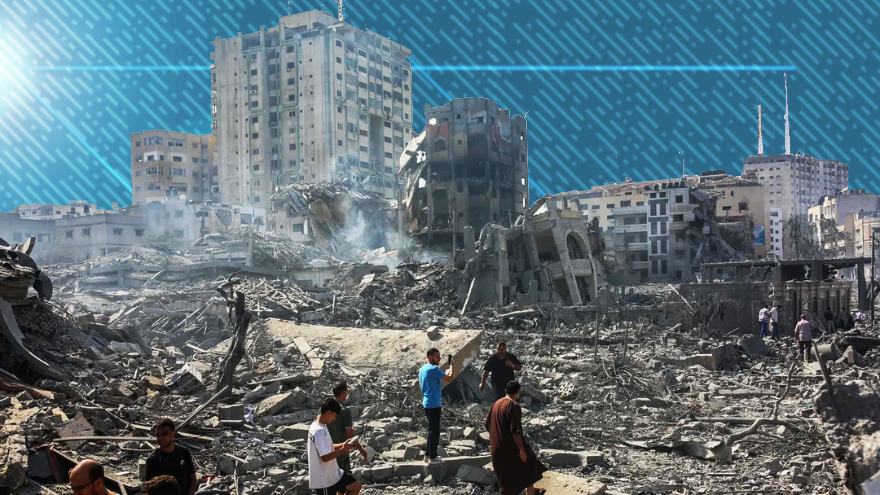Gaza’s hospital system is teetering on the brink of collapse following an intense bombing campaign from the Israeli Defense Forces (IDF).
Israeli officials are carrying out strikes in retaliation for an Oct. 7 attack by the Islamic terrorist organization Hamas, which resulted the deaths of 1,400 Israelis. More than 200 people, including Americans, were believed to be captured and held hostage by Hamas during the offensive.
Israel has since launched airstrikes across the Gaza Strip that have turned buildings into rubble and killed significantly more than the number of its own citizens murdered in the initial Hamas strike.
On Oct. 12, the IDF said it had already dropped about 6,000 bombs in the Gaza Strip over the course of a week, according to warfare experts who spoke with the Washington Post.
“Israel is dropping in less than a week what the U.S. was dropping in Afghanistan in a year, in a much smaller, much more densely populated area, where mistakes are going to be magnified,” Marc Garlasco, a military adviser at the Dutch organization PAX for Peace and a former U.N. war crimes investigator in Libya, told the Post.
In keeping with its policy of “collective punishment” of Palestinians, a practice barred under international law, Israel has bombed civilian infrastructure (including shelters, schools, health, electric, water and sanitation facilities), resulting in the death or injury of more than 400 children each day, according to a report form UNICEF.
Over the past 18 days, the Israeli bombing campaign has killed 2,360 children, while injuring another 5,364 children, UNICEF says. The Palestinian Health Ministry said on Oct. 24 that at least 5,791 Palestinians have been killed — including 704 in a single day just before the announcement — and 16,297 have been wounded by Israeli strikes.
Humanitarian groups have been issuing dire warnings about the consequences of a military campaign in Gaza’s densely populated area already throttled by an Israeli and Egyptian blockade that prevents people from leaving and goods from entering, the Post detailed.
“The killing and maiming of children, abduction of children, attacks on hospitals and schools, and the denial of humanitarian access constitute grave violations of children’s rights,” Adele Khodr, UNICEF Regional Director for the Middle East and North Africa, said in the organization’s bulletin. “UNICEF urgently appeals on all parties to agree to a ceasefire, allow humanitarian access and release all hostages. Even wars have rules. Civilians must be protected – children particularly – and all efforts must be made to spare them in all circumstances.”
Unrelenting attacks have taken a devastating toll on Gaza's children, with a reported 2,360 fatalities and 5,364 injuries.
More than 30 Israeli children have reportedly lost their lives.
We urgently appeal for a ceasefire, humanitarian access, and the release of hostages.
— UNICEF (@UNICEF) October 24, 2023
“The situation in the Gaza Strip is a growing stain on our collective conscience. The rate of death and injuries of children simply staggering,” said Khodr. “Even more frightening is the fact that unless tensions are eased, and unless humanitarian aid is allowed, including food, water, medical supplies and fuel, the daily death toll will continue to rise.”
The World Health Organization (WHO) reports that since the most recent airstrikes began, “a lack of medical supplies, food, water, and fuel have virtually depleted an already under-resourced health system.” The lack of fuel also means trucks are unable to move and generators cannot produce electricity for hospitals.
Rising numbers of patients, along with displaced civilians whose homes have been bombed, have forced Gaza hospitals to operate far beyond capacity.
Doctors lack basic surgical supplies and have been forced to perform surgeries on patients without anesthesia, according to a briefing from the United Nations (UN).
“We are on our knees asking for sustained, scaled up, protected humanitarian operations,” said Dr. Rick Brennan, UN Emergencies Director for the Eastern Mediterranean Region.
As stated in the advisory, the UN Human Rights Council’s Independent Commission of Inquiry, which is investigating alleged violations of international law, says it “unequivocally condemns the killing of over 1,000 Israeli citizens by Hamas and other Palestinian armed groups, injuring thousands more and the taking of more than 200 hostages, including children.”
UN investigators also unequivocally condemn “Israeli military attacks that resulted in the deaths of thousands of Palestinian civilians, as well as hundreds of children.”
Tamara Alrifai, spokesperson for the UN agency for Palestine refugees UNRWA, says that since this past Saturday, 54 trucks have crossed into Gaza from Egypt to deliver humanitarian aid that includes a mix of food, medical supplies, and non-food items.
For perspective, she said, prior to the most recent bombing campaign, 500 trucks used to enter Gaza daily, including at least 100 aid trucks, 45 of them bringing fuel.
She also says there is a “very sturdy diligence system” in place to ensure that everything they receive is only used for humanitarian purposes.
The UN says that UNRWA has so far mourned the loss of 35 staff, most of whom were displaced and working inside the agency’s shelters and facilities to assist the roughly 400,000 people who sought safety there.
